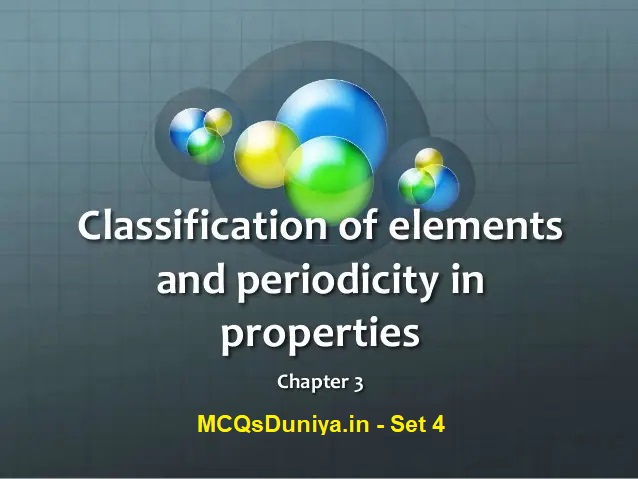CBSE Class 11 Chemistry Chapter 3 Classification of Elements and Periodicity in Properties Multiple Choice Questions with Answers. MCQ Questions Class 11 Chemistry Classification of Elements and Periodicity in Properties with Answers was Prepared Based on Latest Exam Pattern. Students can solve NCERT Class 11 Chemistry Classification of Elements and Periodicity in Properties MCQs with Answers to know their preparation level.
Students who are searching for NCERT MCQ Questions for Class 11 Chemistry Classification of Elements and Periodicity in Properties with Answers are compiled here to get good practice on all fundamentals. Know your preparation level on MCQ Questions for Class 11 Chemistry with Answers. You can also verify your answers from our provided MCQ Class 11 Chemistry Classification of Elements and Periodicity in Properties with Answers. So, ace up your preparation with MCQ of Chapter 3 Chemistry Objective Questions.
MCQ Questions Class 11 Chemistry Classification of Elements and Periodicity in Properties with Answers - Set - 4
Question 1:
Eka-alurninium and Eka-silicon are known as
(a) GalliAn and germanium
(b) Aluminium and silicon
(c) Iron and sulphur
(d) Neutron and magnesium
Correct Answer – (A)
Question 2 :
The group of elements in which the differentiating electron enters the antepenultimate shell of the atoms are called
(a) f-block
(b) p-block
(c) s-block
(d) d-block
Correct Answer – (A)
Question 3 :
Which of the following groupings represents a collection of isoelectronic species? [At. Nos. Cs = 55, Br = 35]
(a) Ca2+, Cs–, Br
(b) Na+, Ca2+, Mg2+
(c) N3-, F–, Na+
(d) Be, Al3+, Cl–
Correct Answer – (C)
Question 4 :
The ions O2+, F–, Na+, Mg2+ and Al3+ are isoelectronic, their ionic radii show.
(a) a significant increase from O2- to Al3+
(b) an increase from O2- to F– and then decrease from Na+ to Al3+
(c) a significant decrease from O2- to Al3+
(d) a decrease from O2- to F– and then increase from Na+ to Al3+
Correct Answer – (C)
Question 5 :
Among the following groupings which represents the collection of isoelectronic species.
(a) NO+, C22−, CO−2, CO
(b) N2, C22−, CO, NO
(c) CO, NO+, CN–, C2−2
(d) NO, CN–, N2, O−2
Correct Answer – (C)
MCQ Questions Class 11 Chemistry Classification of Elements and Periodicity in Properties with Answers
Question 6 :
Pick out the isoelectronic structures from the following
(I) CH+3
(II) H3O+
(III) NH3
(IV) CH−3
(a) I and II
(b) III and IV
(c) I and III
(d) II, III and IV
Correct Answer – (D)
Question 7 :
Identify the least stable ion amongst the following.
(a) Li–
(b) Be–
(c) B–
(d) Cr–
Correct Answer – (B)
Question 8 :
The ionic radii of isoelectronic species N3-, O2- and F– in Å are in the order.
(a) 1.36, 1.40, 1.71
(b) 1.36, 1.71, 1.40
(c) 1.71, 1.40, 1.36
(d) 1.71, 1.36, 1.40
Correct Answer – (C)
Question 9 :
According to the periodic law of elements the variation in properties of elements is related to their
(a) nuclear neutron-proton number ratio
(b) atomic masses
(c) nuclear masses
(d) atomic numbers.
Correct Answer – (D)
Question 10 :
The radii of F, F–, O, D2- are the order of
(a) O2- > F– > F > O
(b) F– > O2- > F > O
(c) O2- > O > F– > F
(d) O2- > F– > O > F
Correct Answer – (D)
- NCERT Solutions Class 11 Chemistry Chapter 1 : Some Basic Concepts of Chemistry
- NCERT Solutions Class 11 Chemistry Chapter 2 : Structure Of The Atom
- NCERT Solutions Class 11 Chemistry Chapter 3 : Classification of Elements and Periodicity in Properties
- NCERT Solutions Class 11 Chemistry Chapter 4 : Chemical Bonding and Molecular Structure
- NCERT Solutions Class 11 Chemistry Chapter 5 : States of Matter
- NCERT Solutions Class 11 Chemistry Chapter 6 : Thermodynamics
- NCERT Solutions Class 11 Chemistry Chapter 7 : Equilibrium
- NCERT Solutions Class 11 Chemistry Chapter 8 : Redox Reactions
- NCERT Solutions Class 11 Chemistry Chapter 9 : Hydrogen
- NCERT Solutions Class 11 Chemistry Chapter 10 : The s-Block Elements
- NCERT Solutions Class 11 Chemistry Chapter 11 : The p-Block Elements
- NCERT Solutions Class 11 Chemistry Chapter 12 : Organic Chemistry: Some Basic Principles and Techniques
- NCERT Solutions Class 11 Chemistry Chapter 13 : Hydrocarbons
- NCERT Solutions Class 11 Chemistry Chapter 14 : Environmental Chemistry




